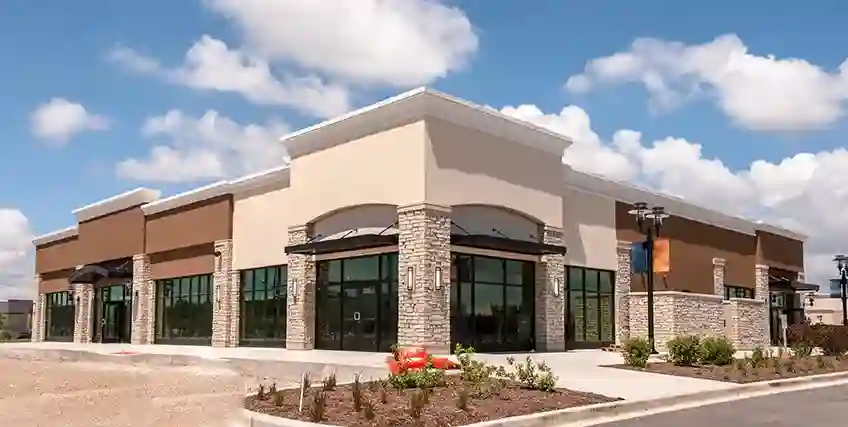Understanding the 10 Basic Commercial Loan Types
September 08, 2025 | Last Updated on: September 08, 2025

Savvy small business owners know you have to spend money to make money. But saying that you need a small business loan and knowing where to start are two very different things. Many business owners don t know what loans are available or which ones they should apply for.
If you re considering expanding your operations by acquiring commercial property or renting a new space, you might consider loans for commercial real estate. Here, we ll explore business real estate loans and other commercial business loans that are available.
In this article:
- Explore commercial real estate loans and other small business loans available to entrepreneurs.
- Learn the common interest rates and basic commercial real estate loan rates you can expect.
- Understand commercial property loan requirements.
Why You Should Consider a Commercial Real Estate Loan
Loans may cause some business owners apprehension. But if you re looking to start or expand a business, a low interest rate loan can sometimes be the difference between rapid growth and failure.
Most startups require significant working capital to launch in a meaningful way. Unless you are willing and able to invest major personal assets, your options are either to seek investors or take out a loan.
A loan keeps you in control of your company (as long as you don t default). Loans for commercial real estate allow you to invest in the property you need to operate and grow your business, with long repayment terms. Borrowers with good credit can lock in good interest rates that will make the commercial real estate loan affordable over time.
Beyond that, commercial business loans can help you add inventory, hire staff, and much more as you build a relationship with a financial institution like a bank or online lender.
Types of Commercial Business Loans Available
While loans for commercial real estate are the best option for businesses that want to own property like office space, warehouses, or factories, there are many other types of small business loans available to entrepreneurs. We break down each of the following below:
- Commercial Real Estate Loans
- Equipment Loans
- Inventory Loans
- SBA Loans
- Term Loans
- Business Lines of Credit
- Bridge Loans
- Commercial Auto Loans
- Commercial Construction Loans
- Hard Money Business Loans
Commercial Real Estate
Many organizations require outside financing to purchase commercial property. Imagine you wanted to buy a new location for your growing business or expand your current site; a commercial real estate loan would provide the capital you need in the form of a mortgage loan.
When considering loans for commercial real estate, lenders will usually look at three things to calculate your creditworthiness: your business finances, personal finances, and characteristics of your target property. Lenders consider small businesses a risk, so they want to ensure that your business cash flow will be enough to cover this type of loan payment. Your business credit score will be taken into consideration, as well.
Commercial property loan requirements are more rigid with traditional lenders like banks and credit unions than they are with online lenders. You can expect a longer loan application and underwriting process than you d get with an online lender.
Equipment Loans
Equipment loans are explicitly used to finance new equipment and machinery essential for running your business. With an equipment loan, you can finance office furniture, farm equipment, commercial ovens, medical equipment, and more.
Like loans for commercial real estate, with this type of loan, the loan amount you receive depends on the value of the equipment or machinery you re financing. If you want to purchase $50,000 worth of equipment, that will be the maximum loan amount you can receive.
In most cases, you must also use the equipment or machinery as collateral against the loan. That way, if you default, the lender will be able to make their money back by collecting the item the loan covered.
The loan term for equipment financing should be determined based on how long you expect to use the equipment. For instance, let s say you need to purchase a commercial oven that you estimate you ll use for ten years. In this case, you ll want a ten-year term loan at most so that you aren t making monthly payments after the equipment is no longer in use.
Inventory Loans
Inventory loans are available for the sole purpose of purchasing inventory. However, they re flexible in terms of what type of inventory you can buy. It can be inventory the business will sell for retail value or that will be used to provide services and increase production in a hospitality setting.
For instance, restaurant owners can purchase ingredients, cleaning supplies, office supplies, plates, silverware, or anything else that might make running the restaurant easier and will help provide better hospitality services.
Like business real estate loans and equipment loans, the loan is typically tied to the inventory you purchase with the loan.
SBA Loans
The SBA loan program consists of loans backed by the U.S. Small Business Administration (SBA). The SBA works directly with small businesses and lenders to help them find the proper financing for their organization. It sets specific guidelines for its partnering lenders, community development organizations, and micro-lending institutions. (SBA). The SBA works directly with small businesses and lenders to help them find the proper financing for their organization. It sets specific guidelines for its partnering lenders, community development organizations, and micro-lending institutions.
SBA loans are designed to open up more opportunities for small businesses that may initially struggle to find a lender for their organization. They do this by reducing the risk to lenders (because the SBA backs the loan). As a result, you may be more likely to be approved for an SBA loan.
Additional benefits include access to expert advice, competitive terms, counseling, education, lower down payments, flexible overhead requirements, and the fact that some SBA loans don t require collateral.
Some of the most popular loan programs are the SBA 7(a) and SBA 504 loan program. Either can be used as a commercial property loan. And, due to the SBA s subsidization, you can often get good commercial real estate loan rates via SBA loans.
Term Loans
Term financing provides basic, flexible loans to small businesses with strong financial statements. You can use the funding to purchase property, hire new employees, change branding, expand your inventory, upgrade equipment and machinery, improve employee training, and much more. This type of loan is given in one lump sum that you re required to pay back with interest over a certain period. The loan rates can be either fixed or variable.
You can use a term loan as a loan for commercial real estate.
Business Line of Credit
A business line of credit is a flexible loan that works similarly to a credit card. Let s say your balance sheet qualifies you for a line of credit of $100,000. You would then be able to access up to that much cash but would only pay interest on the portion you use. Many organizations choose this route when calculating options for unexpected costs.
With a business line of credit, you can draw funds as you need and repay them over time. But you can do this as often as you need. The loan never officially runs out so long as you make your payments on time and don t exceed the loan limit. As such, it differs from a term loan, and typically the loan amounts are smaller.
Bridge Loans
Commercial bridge loans provide immediate cash flow, but the interest rates are typically higher than other loan types. They are short-term loans (with up to one-year repayment schedules) used until an organization finds permanent financing. They are generally backed by collateral and are often used in commercial real estate, like when an organization wishes to change locations but hasn t sold the first one yet. Once the current or former piece of property sells, the payment from the sale will go toward the bridge loan and the new property.
It s uncommon to use a bridge loan as a loan for commercial real estate, but you could in the right situation.
Commercial Auto Loans
Commercial auto loans are exactly what they sound like: loans made to purchase or refinance company vehicles. They re a type of commercial property loan.
While you can use term loans or a business line of credit to buy a company vehicle, one of the benefits of directly applying for a commercial auto loan is that it comes with built-in collateral. Similar to financing a personal car, the company vehicle is considered collateral. By having the built-in collateral, you will find that commercial auto loans may cost less and be easier to qualify for than other traditional loans.
Commercial Construction Loans
Commercial construction loans are short-term loans granted with the sole purpose of building a new business location or expanding an old one. If a business owns the property, any equity already put into the property can be used as a down payment toward the loan. This is the type of loan you will want to consider if your company is looking into doing any construction that is directly related to the business.
Hard Money Loans
Hard money business loans are financial solutions to organizations unable to meet qualifying requirements for a traditional commercial loan. This opens the door for companies with a poor credit history or too little time in business.
Often, businesses use commercial property as collateral for this type of loan, so it s almost the opposite of a loan for commercial real estate. Since this is an asset-based loan, you will need to have a lot of collateral to put on the table to qualify for a hard money loan.
Traditional vs. Alternative Commercial Lenders
When looking for a commercial lender, you might ask yourself where you should look for the one that best fits you. There are two different avenues of business lending that you can look into: traditional commercial lenders and alternative commercial lenders.
Traditional commercial lenders are those that offer term loans, including various banks, credit unions, and SBA lenders. They re often the first lenders that a business owner might reach out to when trying to secure a loan, as they are the most well-known sources.
If you feel intimidated by traditional business loans or you don t have a relationship with a business bank, another option is to look into alternative commercial lenders like Biz2Credit.
These lenders try to eliminate the guesswork of applying for a commercial real estate loan. While you ll need the same information about your company as you use for applying for a traditional loan, alternative lenders provide a more straightforward application process, faster decision turnaround time, quicker fund disbursement, and a wide range of loans available. You can apply for a small loan or a large loan and still take advantage of lower interest rates, depending on your business needs.
Conclusion
Whether you re looking for loans for commercial real estate or another business need, the process doesn t have to be intimidating. There are loans available for every type of business need, each with its own set of pros and cons. Traditional lenders are an excellent source for gathering information to help you decide which type of loan you need, but sometimes they aren t the best route.
That s where alternative commercial lenders such as Biz2Credit come in. They strive to make the application process more accessible and less time-consuming and provide an alternative option for businesses that may not qualify for traditional loans.
FAQs
What is a commercial real estate loan?
A commercial real estate loan is a loan provided to a borrower to purchase commercial real estate.
What are the commercial property loan requirements?
Loan eligibility requirements vary by lender, but generally lenders will assess an applicant s business finances, personal finances, and the characteristics of the target property when weighing approval. Many lenders have minimum credit score requirements, annual revenue requirements, and need a down payment for a commercial mortgage.
What are some common types of commercial loans?
Some of the most common types of commercial lending include commercial real estate loans, term loans, business lines of credit, and SBA loans.
What s the difference between traditional and alternative lenders?
Traditional financial institutions are banks and credit unions that have stricter loan requirements and offer both fixed-rate and variable rate loans. Alternative lenders are private enterprises that provide a variety of loan products and financing options to more borrowers, but may have higher interest rates. Both money lenders
How do you get a commercial real estate loan?
Whether it s for a real estate investment property or business expansion, getting a commercial real estate loan requires you to find a property that makes sense for you and apply for a bank loan. There are several types of commercial real estate loans, from regular commercial mortgages to term loans, so you ll have to determine the right loan option for you and your business.




